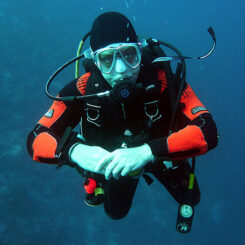
IF YOU’RE AN AVID swimmer, maybe you’ve noticed that your teeth feel a little more sensitive after you get out of the pool. It’ll take more than one swim to do it, but this is a real thing called “swimmer’s calculus,” and it’s just one way swimming can affect our teeth.
What Is Swimmer’s Calculus?
Swimmer’s calculus is the result of prolonged exposure to the acidic chlorine ions in pool water. Chlorine is very good at keeping the water sanitary for people to swim in, but it also changes the pH of the water if the levels aren’t closely monitored.
Our teeth are highly vulnerable to acid erosion. Casual swimmers don’t have much cause to worry, but swim teams, water polo players, and anyone whose preferred workout is swimming laps could be at a greater risk of developing yellow and brown stains on their teeth.
Dental Health Concerns of Scuba Divers
If all of your underwater adventures are in natural bodies of water rather than swimming pools, you may not need to worry about swimmer’s calculus, but scuba diving comes with its own dental problems.
Anyone who has touched the bottom of a diving area in a pool has felt the pressure building up in their ears the deeper they go. That pressure can build up in teeth as well. It’s called “tooth squeeze” or barodontalgia, and it mostly affects teeth with untreated cavities or teeth that have had faulty dental work done. The building pressure can be very painful and can even fracture the tooth! That’s why we recommend scheduling a dental visit before your first dive of the year.
Scuba Mouthpieces and Your Jaw
Unless you go diving all the time, you probably don’t have a custom-fitted mouthpiece for scuba diving. Most divers agree that the “one size fits all” mouthpieces don’t really live up to their name. Divers are forced to clench their teeth around the mouthpieces for the entire dive, which is quite the ordeal for their jaws. Anyone who dives more than once or twice a year should consider investing in a custom-fitted mouthpiece to avoid the risk of TMJ issues.
Bring Us Your Tooth-Related Swimming Questions!
We’re happy to answer any other questions you may have about dental health and safety when it comes to swimming and diving. For a final quick tip, keep in mind that tooth injuries are common around swimming pools because of all the slippery surfaces. Avoid running, be careful how fast you come out of the water at the edge of the pool, and definitely don’t dive in shallow water. Stay safe and have fun!
